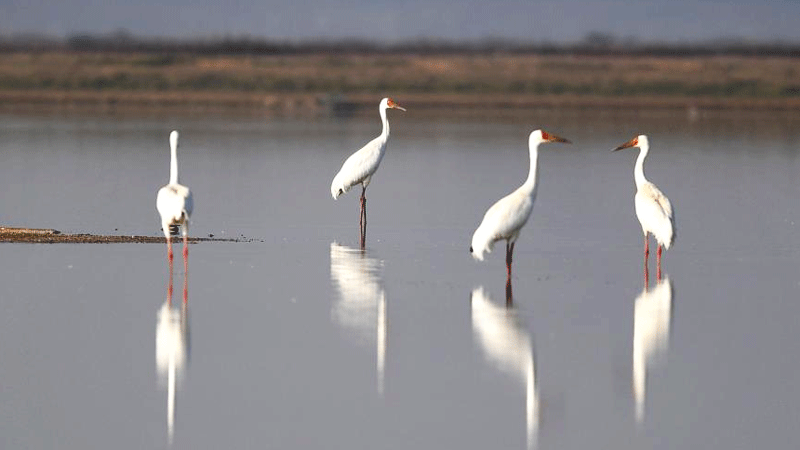Feature: U.S. Midwestern cities seek investment, trade with China
CHICAGO, Dec. 15 (Xinhua) -- Mayors of U.S. Midwestern cities attending the recent 6th China General Chamber of Commerce (CGCC) - Chicago Annual Gala held in Chicago hope to seek more trade and cooperation opportunities with China.
"There's Chinese investment right here in Chicago... To me, that investment should also trickle into Elkhart as well," said Rod Roberson, mayor of Elkhart in Indiana, in an interview with Xinhua on the sidelines of the meeting. "I'm hopeful in this conference that we will be able to meet and begin to bring contingencies to Elkhart, and we can travel to China as well."
"I want to make sure where we can get to investors that would like to be a part of our ecosystem in Elkhart," he added. "I don't want to chase dollars. What I want to do is chase opportunities that make both communities better."
Wausau City in Wisconsin is a big producer and exporter of ginseng in the United States. "It's a multi-million dollar industry for us," Mayor Katie Rosenberg told Xinhua, adding that tariffs make it hard for the local economy.
Rosenberg hailed the meeting between leaders of the two countries not long ago. "We need to continue regularly having these communications with each other. Our economies depend on each other. We're both large economies, the U.S. and China. We can't do this without each other."
"We can figure out where we are more similar. If we invest more in those diplomatic relationships than we do in kind of the security relationships, that will be good for all of us," she added.
Minnesota has more than 50 companies that do business in China, and has got 16 companies from China that do business in Minnesota, said James Hovland, mayor of Edina in Minnesota, citing the state trade office. Minnesota exports about 2.7 billion U.S. dollars of products annually to China, and imports about 4.5 million dollars in value from China. "China is our state's second largest trading partner."
"We have a good opportunity to better the relationship by starting people to people, company to company, state with province in China, and worked from basically the ground up... Being the two largest economies in the world, we should be working together and recognizing that we need each other. We have a relationship that is important to preserve," Hovland said.
It's almost like the world has become one community. "The countries we recognized now are just part of a big neighborhood living on the same planet. So I like to get along with my neighbor... It's important that we think about how we're gonna get along with our neighbors and have everybody prosper," Hovland said.
Jamael Tito Brown, mayor of Youngstown in Ohio, has traveled to China once in a business trip. "I'm probably the first mayor taking that trip because I realized that you have to expand your borders and broaden your mind," he said with a smile.
"I went over there, learned about the culture and the relationships, and the investment... I love to continue those relationships and continue building that connection from Youngstown, Ohio, to China."
Brown said he can't wait to go back to China.
"When you get to the local level, we're looking at what's the best way and the best opportunity. It's about branding and trust for small cities, mayors. If you're gonna bring us some jobs, you're gonna do investment and you're gonna impact our community, that's all we care about, and building relationships with one another," said Brown.
"We're gonna get past the politics or the personal matters and make it all about the people," Brown continued. "As a mayor, it can't be a Republican issue, it can't be a Democrat issue, it has to be a people issue. I just want to get more jobs. I want my community to thrive and opportunity for us as a declining city."
Not far from the Illinois State University, Normal Town in Illinois has electric vehicle manufacturing, and agribusiness, Mayor Chris Koos introduced.
"I would say there are geopolitical issues, but that's a larger picture. When you get down to a lower level, people dealing with people, businesses dealing with businesses, I think you could break those boundaries," Koos said. "We deal with people's issues day to day. We provide them with services. We try to provide them with public safety things."
China and the United States would just make contacts with people, he said.
Photos
Related Stories
- Chip suit aims to safeguard supply chains
- Washington reportedly ropes in allies to corner Beijing's semiconductor industry, while China fights back with WTO lawsuit
- Interview: China, U.S. could resume health cooperation, says U.S. expert
- China, U.S. efforts needed to restore ties: spokesperson
- China-U.S. climate collaboration hailed despite difficulties
- Chinese vice FM holds talks with visiting U.S. officials
- US govt, not China, responsible for its own economic problems
- US called on to respect China's core interests
- US politician’s attempt to add fuel to tech war with China self-harming
- US disinformation campaigns on Xinjiang: A playbook of "thief crying 'stop thief'"
Copyright © 2022 People's Daily Online. All Rights Reserved.









